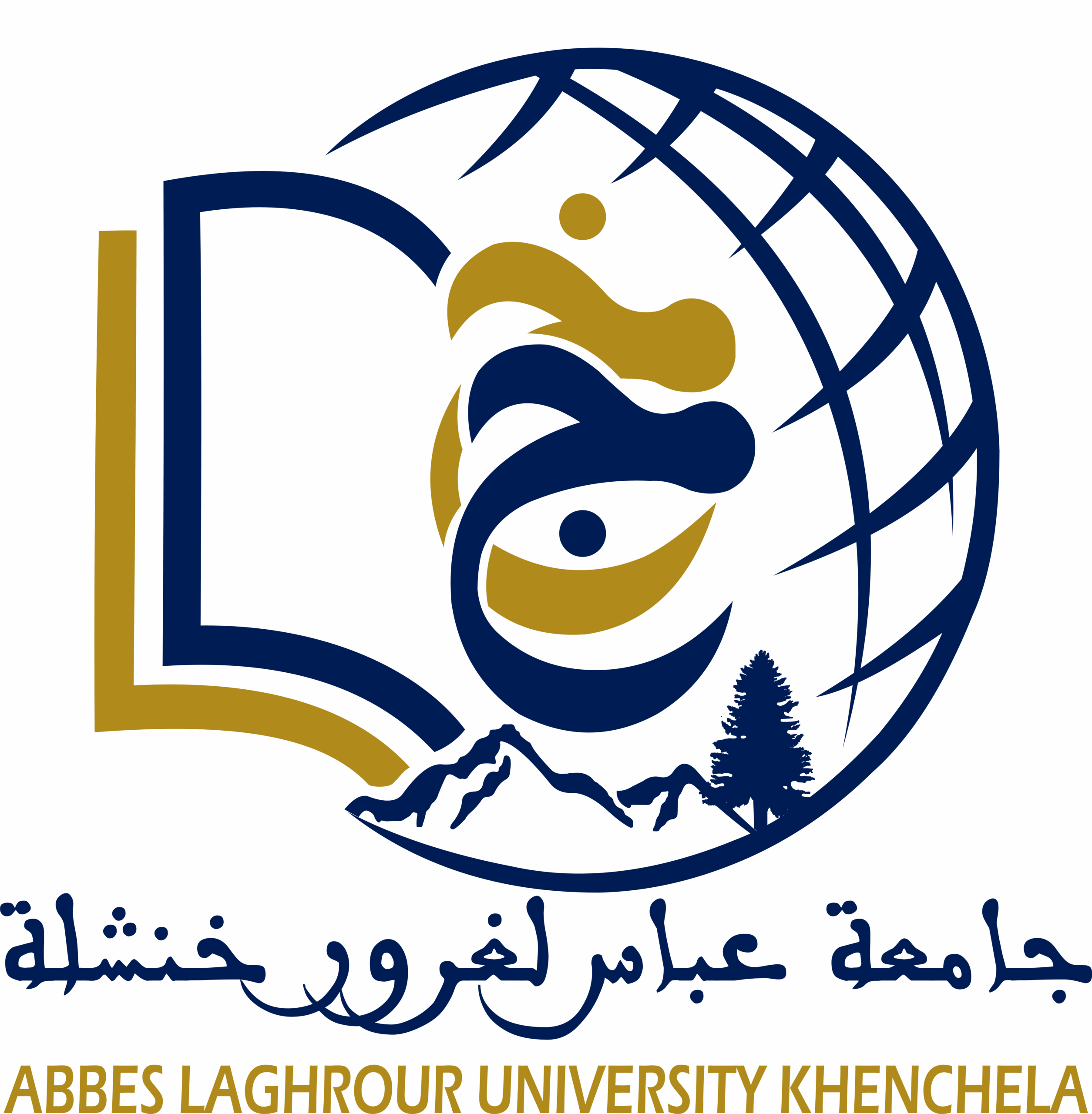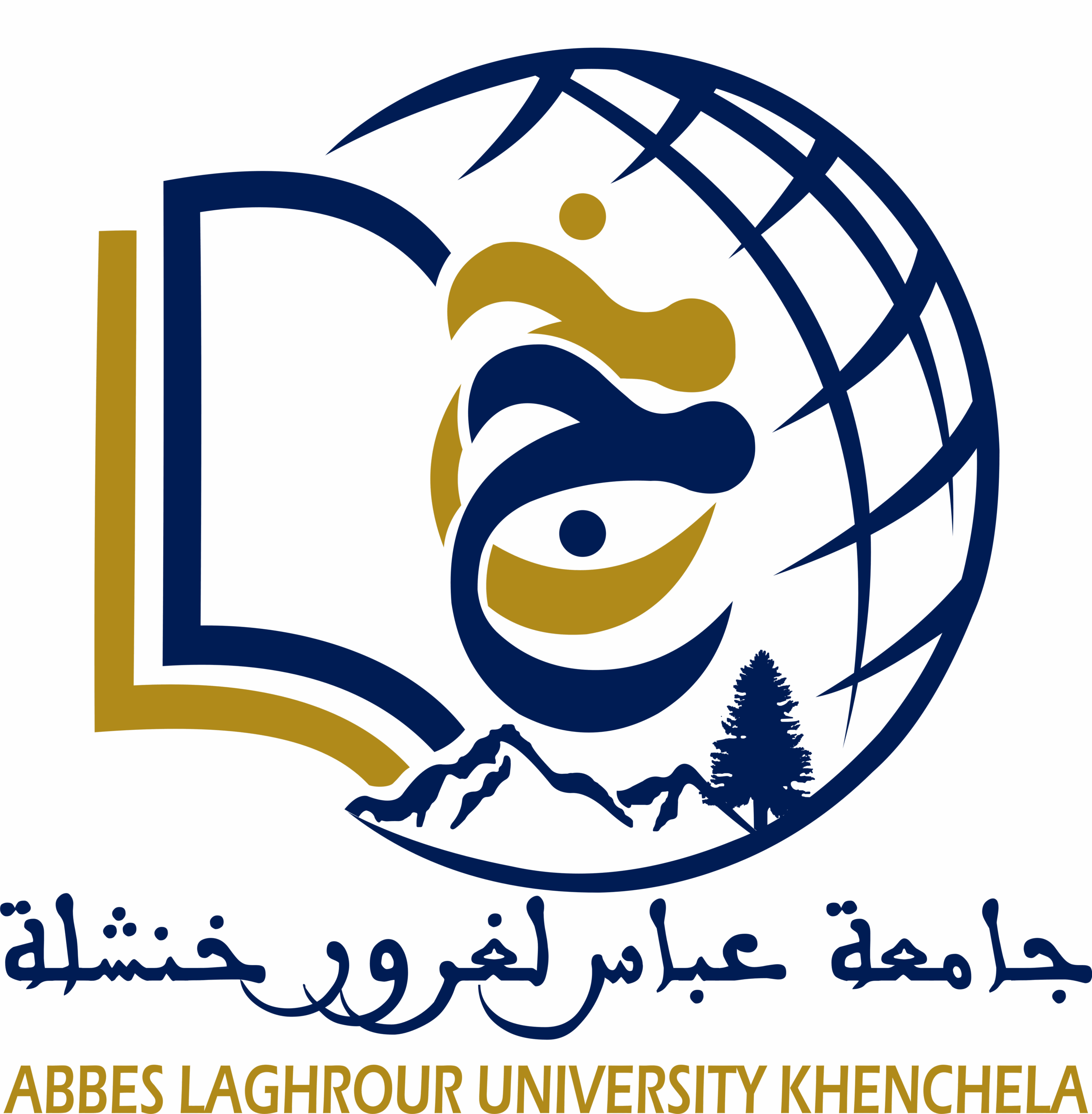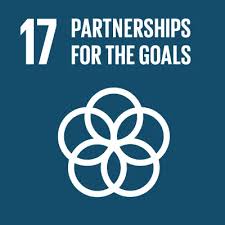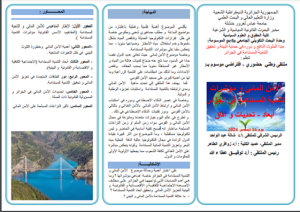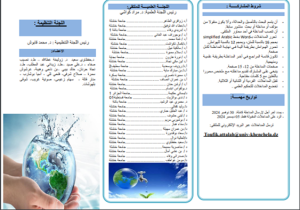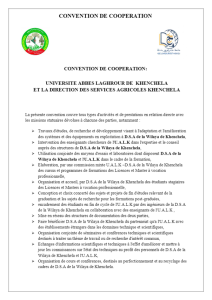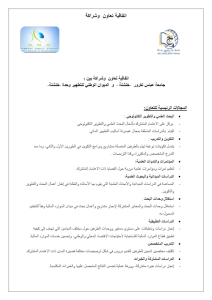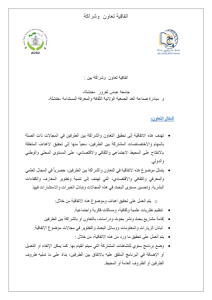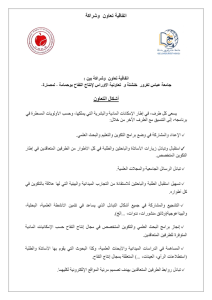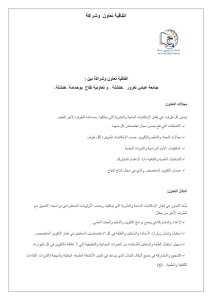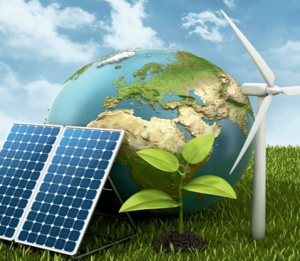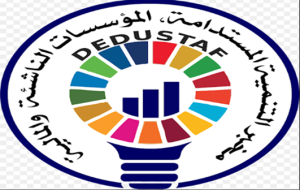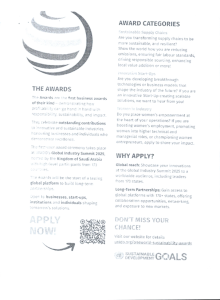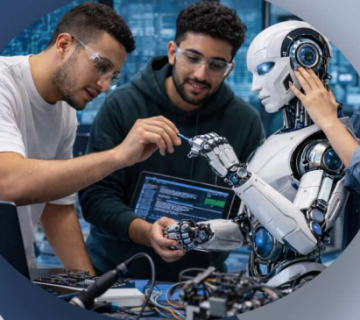SDG 17: Partnerships for the Goals
Abbes Laghrour University Khenchela, based on the detailed report, is a pioneering model in achieving SDG 17, as it adopts a comprehensive and integrated approach based on institutional partnership, policy-oriented scientific research, and broad community education.
The following is a detailed analysis of the university’s contributions to each indicator of SDG 17:
17-02 Relationships to Support the Goals
17-02-01: Does your university directly participate or provide input to national government or regional non-governmental organizations in developing sustainable development goals policies?
Yes, Abbes Laghrour University Khenchela participates directly and effectively in all stages of sustainable development policy development, from diagnosis to adaptive management, as follows:
- Identifying Problems and Challenges:
- The university plays a pivotal role in diagnosing developmental challenges through conducting in-depth and comprehensive studies and research, identifying environmental problems (such as water management issues and water scarcity, desertification, waste management), economic problems (such as unemployment, limited economic diversification), and social problems (such as rural migration, disparity in services) facing the Aurès region.
- It relies on advanced methodologies including direct field surveys, advanced statistical analysis, and mathematical modeling of environmental and economic phenomena.


- 2-Developing Policies and Strategies:
- University professors contribute directly to high-level government advisory committees and workshops dedicated to preparing national and local development plans. Within the framework of cooperation agreements with formal and informal government institutions such as:
- The university provides specialized technical consultations to provincial directorates (environment, agriculture, energy) and participates in formulating comprehensive local strategies for sustainable development, such as developing biodiversity protection strategies and establishing supportive policies for the green economy and eco-tourism.





- 3. Modeling Potential Future With and Without Interventions:
- The university is distinguished by conducting advanced prospective studies through modeling potential future scenarios, especially in the field of climate change. It has developed three main scenarios (continuation of current situation, moderate intervention, ambitious intervention) to assess the impact of different policies on temperature rise, agricultural production, and emission levels.
- It uses specialized tools such as Geographic Information Systems (GIS), mathematical modeling, SWAT and MODFLOW software for water resources, and LEAP for energy planning.
- 4. Monitoring Interventions and Preparing Reports:
- The university contributes to developing and tracking key performance indicators at the local and national levels (air and water quality indicators, afforestation, economic growth, unemployment, access to services)
- It issues comprehensive annual reports on the state of the environment in Khenchela, sectoral reports, and evaluation reports for development projects, providing a strong knowledge base for decision-makers.
- This is done by Research Team No. 1:


- Research Team 01: Green Economy Green Economy and Renewable Energy Laboratory Team Leader: Dr. Ali Khenafer Specialization: Economic Development Email: khenafer.ali@univ-khenchela.dz
Name and Surname Latest Degree Academic Rank Specialization Affiliated University Akram Laour Habilitation Associate Professor A Environmental Economics and Sustainable Development Abbes Laghrour Khenchela Hala Abdeli Doctorate Associate Professor B Finance and Enterprise Management Abbes Laghrour Khenchela Aaqab Noureddine Master’s Assistant Professor A Public Management Abbes Laghrour Khenchela Research Team Objectives: The general objectives of the Green Economy research team can be clarified as follows:
- Adopting the green economy as a national orientation
- Conducting analytical and exploratory studies of economic operators at the level of the Algerian economy as a starting point for developing strategies to activate investment in the green economy.
- Enabling Adaptive Management:
- It plays a pivotal role in continuous learning through documenting and analyzing successful and failed practices, and measuring the actual impact of policies.
- It provides specialized training programs for decision-makers including courses in strategic planning, adaptive management, and data analysis, and encourages the launch of pilot projects to evaluate innovative solutions before expansion. Various local administration cadres are trained such as: the province, municipalities: El Abiodh, Hamla, …Public Treasury, judges….
17-02-02: Does your university as an institution initiate and participate in cross-sector dialogue on sustainable development goals?
Yes, the university occupies a leading position as a main platform for multi-sectoral dialogue and institutional initiatives:
- Organizing Major Events: The university initiated organizing a series of conferences and forums bringing together government, non-governmental organizations, and the private sector, most notably:
- National Conference on “Real Estate and Its Role in Sustainable Development” (2017): Brought together representatives from the ministries of housing, state property, and public works, academic experts, real estate developers, and environmental associations.
- International Forum on “Algeria and the Imperative of Transition to Green Economy” (2018): Attracted experts from 15 countries, representatives from ministries of environment, energy and industry, major companies (such as Sonelgaz), and civil society, resulting in the “Khenchela Declaration for Green Transition.”
- “Water Governance” Forum (2020): Brought together water, irrigation, agriculture, environment, and local community sectors, and adopted an advanced dialogue methodology leading to recommendations to establish a supreme water council and update water law.
- Sustainable and Institutional Dialogue Mechanisms: The university established permanent dialogue platforms to ensure continuity and regular interaction, including:
- Advisory Council for Sustainable Development (established 2019): Includes representatives from all sectors and meets quarterly.
- Annual Partnerships Forum: Brings together more than 150 partners to sign agreements.
- Organizing specialized and methodological participatory workshops (on circular economy, eco-tourism, and smart agriculture).
- Permanent Joint Committees: The university formed joint committees to coordinate efforts, such as the Environment and Development Committee, Renewable Energy Committee (with Sonelgaz), and Water and Irrigation Committee (with Agriculture and Environment).

- 7-02-03: Does your university as an entity participate in international cooperation regarding the collection or measurement of data related to sustainable development goals?Yes, the university actively contributes to international cooperation in data collection and measurement:
- Participation in International Research Programs: The university participates in major research programs with international partnerships, such as the “Assessment of Water Resources under Climate Change” project in cooperation with the University of Montpellier (France), University of Tunis El Manar (Tunisia), and the International Water Management Institute (IWMI).
- Unified Methodologies: The university is committed to using unified methodologies and agreed-upon international standards, using certified measuring devices and unified research protocols, ensuring comparability and integration between locally and globally collected data.
- Contributing to Global Databases: The university contributes by uploading collected and processed local data (climate, biodiversity, water quality, social and economic indicators) to specialized international platforms to support comprehensive global analyses and formulation of international policies.
17-02-04: Does your university as an entity, through international cooperation and research, review comparative approaches and develop international best practices in dealing with sustainable development goals?
Yes, the university exchanges expertise and develops practices through research and international partnerships:
- Research and Consultancy Partnerships: The university has developed strategic research partnerships with global universities (such as Southwest State University of Russia, and institutions in France, Tunisia, Morocco, and Spain) to implement joint projects in renewable energy, water management, and green economy.
- Reviewing International Experiences: The university’s major events included presentations of “pioneering international experiences in the field of green transition,” indicating a review of comparative approaches. International virtual meetings also included exchange of experiences in achieving sustainable development goals.
- Training and Capacity Building: The university organizes specialized training courses in cooperation with international partners on modern data collection techniques, advanced statistical analysis, and modeling software, transferring best methodological practices to its cadres.
- Knowledge Dissemination: The university publishes its research results in peer-reviewed international scientific journals with high impact factors, contributing to enriching global knowledge about sustainable development in arid and semi-arid regions.
17-02-05: Does your university as an entity cooperate with non-governmental organizations to address sustainable development goals?
Yes, cooperation with non-governmental organizations and civil society is a fundamental pillar of the university’s work:
- Inclusion in National Dialogue: The university involves non-governmental organizations (such as environmental and consumer protection associations) as main participants in all its major conferences and forums (real estate, green economy, water governance), and the president of the Provincial Environmental Protection Association participates in the university’s international meetings.
- Organizing Joint Initiatives: The university organized the National Forum “Green Algeria” in partnership with the Provincial Association for Environmental Protection and Advancement of Sustainable Development, which attracted students and local citizens to raise awareness of environmental issues.
- Partnership in Applied Projects: The university cooperates with associations in model local projects; in the urban waste management model, associations undertook the role of community awareness and mobilization for the success of the waste sorting at source project.
17-03 Publishing SDG Reports
17-03-01 to 17-03-17: Please indicate whether your university publishes progress in achieving SDG 1… up to SDG 17.
Yes, Abbes Laghrour University Khenchela regularly publishes progress in achieving all seventeen sustainable development goals:
Abbes Laghrour University Khenchela is committed to ensuring transparency and accountability regarding its efforts in achieving sustainable development. Based on its institutional commitment, the university publishes progress in achieving all 17 goals, using diverse publication mechanisms including periodic reports and specialized research outputs for each goal separately.
SDG Number Goal Name Publication Mechanisms and Output Types Documented by the University SDG 1 No Poverty Included in comprehensive periodic reports: The university regularly publishes reports on progress in achieving “Goal 1 (No Poverty)” explicitly. (University report) SDG 2 Zero Hunger Included in comprehensive periodic reports and specialized research: The university publishes reports on progress in achieving “Goal 2 (Zero Hunger)”. Research related to “sustainable agriculture,” “smart agriculture,” and “aquaculture” (such as trips of master’s students in ecology and environment) and PRFU outputs serve this goal. SDG 3 Good Health and Well-being Included in comprehensive periodic reports and research: The university publishes progress in achieving Goal 3. Research related to “water quality” (SDG 6) and “air quality” (SDG 13) and publications of research teams on “health” (Laboratory of Biotechnology, Water, Environment and Health) contribute to and publish about this goal. SDG 4 Quality Education Included in comprehensive periodic reports and education contributions: The university publishes progress in achieving Goal 4. The university’s commitment to “providing meaningful education on sustainable development goals throughout the university” and offering “specialized courses” is part of the progress report on this goal. SDG 5 Gender Equality Included in comprehensive periodic reports: The university publishes progress in achieving Goal 5. Social indicators related to “gender equality” are included in monitoring and follow-up systems the university contributes to developing. SDG 6 Clean Water and Sanitation Included in periodic reports and specialized conferences: The university publishes progress in achieving Goal 6. Notable published contributions include: “Water Governance Forum between Management and Sustainable Abundance to Face Scarcity and Rising Crises (2020)” which published strategic recommendations, in addition to research on “mathematical modeling of water movement” and “water consumption rationalization techniques.” SDG 7 Affordable and Clean Energy Included in periodic reports and specialized seminars: The university publishes progress in achieving Goal 7. Notable published contributions include: Doctoral seminar on “Renewable Energy” which addressed the national orientation toward renewable energy and its legal framework, and joint projects with the Renewable Energy Committee (with Sonelgaz). SDG 8 Decent Work and Economic Growth Included in periodic reports and economic forums: The university publishes progress in achieving Goal 8. Publications such as “International Forum on Transition to Green Economy (2018)” and “Conference on Real Estate and Its Role in Sustainable Development (2017),” and work on developing “supportive policies for small and medium enterprises” fall under this goal. SDG 9 Industry, Innovation and Infrastructure Included in periodic reports and innovation events: The university publishes progress in achieving Goal 9. The university’s role in organizing “National Innovation and Sustainable Development Service Salon” and “Contribution to the National Innovation Salon” stands out as a mechanism for publishing progress in innovation. SDG 10 Reduced Inequalities Included in comprehensive periodic reports: The university publishes progress in achieving Goal 10. Social indicators related to “disparity in access to basic services” are included in monitoring and follow-up systems the university contributes to developing. SDG 11 Sustainable Cities and Communities Included in periodic reports and local projects: The university publishes progress in achieving Goal 11. Published contributions include results of the participatory “Urban Waste Management Project,” and research on “urban planning” and “sustainable smart cities” (within the doctoral seminar). SDG 12 Responsible Consumption and Production Included in periodic reports and directed research: The university publishes progress in achieving Goal 12. Research on “circular economy” (participatory workshops) and “sustainable consumption” and “natural resource consumption rationalization” are published under this goal. SDG 13 Climate Action Included in periodic reports, conferences and research: The university publishes progress in achieving Goal 13. Publications such as results of “modeling future scenarios for climate change,” recommendations from “International Forum on Transition to Green Economy,” and research on “climate change adaptation” are evidence of publication. SDG 14 Life Below Water Included in periodic reports and specialized research: The university publishes progress in achieving Goal 14. Specialized research related to “aquaculture” conducted by master’s students and their scientific trips, and contributions to “water governance,” are part of the university’s published contributions to this goal. SDG 15 Life on Land Included in periodic reports and specialized research: The university publishes progress in achieving Goal 15. Publications such as “National Conference on Forest Heritage in Algeria” (2022), and research results on “biodiversity protection” and “protected area management,” and “valorization and exploitation of plants,” serve this goal. SDG 16 Peace, Justice and Strong Institutions Included in periodic reports and legal research: The university publishes progress in achieving Goal 16. Research related to “legal framework for renewable energy” and “enforcement of environmental laws” and “determination of legal responsibilities” (from the doctoral seminar of the Faculty of Law) is an academic contribution published under this goal. SDG 17 Partnerships for the Goals Included in comprehensive periodic reports and partnership documents: The university publishes progress in achieving “Goal 17 (Partnerships for the Goals).” All national and international agreement and cooperation documents, results of multi-sectoral dialogue, and monitoring and follow-up reports are publications about this goal. 17-04 Education for Sustainable Development Goals
17-04-01: Does your university as an entity commit to providing meaningful education on sustainable development goals throughout the university?
Yes, the university is committed to providing meaningful education on sustainable development goals:
- Commitment and Integration: The university is committed to providing meaningful education on concepts and issues of sustainable development throughout the university.
- Relevance and Specialization: These concepts and issues are integrated into various curricula in ways appropriate to students’ different specializations, seeking to ensure this education is “relevant and applicable.” This applies to all specializations in humanities and natural sciences such as: lectures in the second semester, Environmental and Sustainable Development course for third-year Sociology bachelor students, Sustainable Development and Anti-Corruption course for second-year Political Science bachelor students. This course aims to inform students that the concept of well-being in development does not stop at narrow economic standards and satisfaction of basic needs and the like, but extends to human dimensions and its sustainability depends on rationalizing it and combating corruption.
Academic and research publications extracted from Abbas Laghrour University of Khenchela (or with participation of its researchers) also demonstrate a broad commitment to Education for Sustainable Development (ESD). This education is not limited to curricula only, but extends to dedicated research and studies led by students under the supervision of professors, reflecting the actual integration of sustainability issues in the academic curriculum.
The following is a summary of those publications within the framework of education for sustainable development goals, arranged according to the main goals they serve:
SDG Published Research/Studies (Publications and Professors) Significance in the Framework of Education for Sustainable Development (ESD) SDG 2 Zero Hunger SDG 3 Good Health SDG 8 Decent Work and Economic Growth “Sustainable Development Indicators in Algeria and Food Security Challenges” (2024). Policy-Oriented Education: This thesis is an example of student-directed research (master’s/doctoral thesis) that integrates sustainable development indicators with vital national challenges (food and health security). This teaches students how to analyze gaps between sustainable development dimensions and provide a knowledge base for decision-makers. SDG 7 Affordable and Clean Energy SDG 13 Climate Action “Investment in Renewable Energy Sources as an Inevitable Alternative to Achieving Sustainable Development Dimensions” 2017. Solutions-Based Education: This study focuses on the importance of renewable energy as an “inevitable alternative” to achieving sustainable development and environmental protection. This type of research teaches students to search for clean technological solutions as a response to sustainability challenges, reflecting the integration of clean energy in economic and environmental curricula. SDG 11 Sustainable Cities and Communities SDG 12 Responsible Consumption and Production SDG 16 Peace, Justice and Strong Institutions “Urban Planning Problems in Khenchela City” 2025. Community-Oriented Education: A study focusing on a local problem: absence of tight urban planning, weak population participation. This directs students to analyze local urban problems in the context of urban sustainability, comprehensive sustainable urban development, and calls for activating local participation mechanisms, reflecting the participatory planning approach in education. SDG 11 Sustainable Cities and Communities SDG 16 Peace, Justice and Strong Institutions “The Role of Local Communities in Achieving Urban Innovation: Field Study in Khenchela Municipality” 2025. Education on Innovation and Institutional Transformation: Focuses on the role of municipality/local communities as “the closest actor to society” and capable of embodying “innovative solutions” to achieve sustainable and comprehensive development. This teaches students the role of urban innovation and the necessity of institutional change in achieving sustainability. SDG 11 Sustainable Cities and Communities “The Role of Urban Planning in Sustaining the Algerian City” 2023. Education on Participatory Planning: The study emphasizes the necessity of urban planning in facing urbanization challenges and environmental degradation, and stresses the necessity of “active participation of residents” under the name “participatory planning.” This reflects the integration of spatial justice and community participation concepts as essential elements in sustainability education. SDG 7 Affordable and Clean Energy SDG 13 Climate Action SDG 16 Peace, Justice and Strong Institutions “Using Nuclear Energy for Electricity Generation and Its Effects on Environmental Security” 2023. Education on Risks and Alternatives: This research represents an advanced discussion on achieving sustainable development through energy choices, focusing on assessing environmental risks: radiation leaks, nuclear waste. This enhances students’ critical thinking skills and balancing between energy need and environmental security. SDG 8 Decent Work and Economic Growth SDG 17 Partnerships “Venture Capital as a Support and Financing Mechanism for Impact Investments – MENA Region Experience –” 2022. Impact-Oriented Financial Education: The study focuses on financing “impact investments” that serve sustainable development. This teaches students innovative financing mechanisms and the role of the financial sector in supporting projects that contribute to achieving environmental and social goals. SDG 17 Partnerships SDG 16 Peace, Justice and Strong Institutions “The Importance of Arbitration as a Method for Resolving BOT Contract Disputes in Establishing and Managing Public Facilities” 2015. Education on Public-Private Partnership (PPP): This study focuses on BOT contracts as a mechanism to “ensure sustainable development especially in the field of infrastructure and public facilities for developing countries within the partnership framework.” This teaches students the legal and structural aspects of implementing Goal 17 through effective partnerships. These publications demonstrate that Abbes Laghrour University Khenchela does not merely provide theoretical information, but adopts an advanced educational approach characterized by the following:
- Research-Oriented ESD: Sustainability issues are integrated into student research topics, encouraging deep and comparative analysis of national challenges (food security, clean energy) and local challenges (urban planning).
- Solutions-Focused ESD: Studies focus on searching for practical alternatives (renewable energy, urban innovation, Islamic finance) to address problems.
- Teaching Participatory and Institutional Skills: Students are taught concepts of participatory planning and the necessity of involving residents in decision-making, and the role of local communities in leading sustainable development.
- Integration of Legal and Financial Dimensions: Research shows integration of legal dimensions (arbitration, legal framework for nuclear energy) and financial dimensions (venture capital) of sustainability issues, providing students with a comprehensive and multidisciplinary understanding.
17-04-02: Does your university have dedicated courses (full degrees, or elective courses) addressing sustainability and sustainable development goals?
Yes, the university offers dedicated courses in sustainability fields:
- Course Diversity: The university offers a diverse range of specialized courses on sustainability topics and sustainable development goals, including elective courses in addition to complete academic programs focused on these areas.
- Specialized Education: This specialization is manifested in the presence of master’s students specialized in fields such as “Ecology and Environment” who participated in scientific trips specialized in sustainable water management and aquaculture.
17-04-03: Does your university as an entity have dedicated educational awareness activities for the broader community?
Yes, the university implements wide-ranging awareness and educational activities targeting the broader community:
- Community Awareness: The university organizes educational and awareness activities targeting diverse segments of society, including graduates, local residents and displaced persons, aiming to spread awareness and knowledge of sustainable development goals.
- Direct Initiatives: Notable examples include:
- Organizing the National Forum “Green Algeria” which targeted more than 400 university students, high school students, parents, local residents, and media professionals.
- Organizing practical workshops and awareness campaigns such as recycling and organic farming workshops and afforestation campaigns, resulting in raising awareness of more than 2000 people and launching 10 local environmental initiatives.
- Organizing the National Environmental Education Competition 2023 under the slogan “Our Environment, Our Future.”
17-04-04: Does your university as an entity measure the extent of students’ knowledge of sustainability?
Yes, Abbes Laghrour University Khenchela measures students’ perception and knowledge of sustainability periodically and indirectly through multiple institutional mechanisms, in addition to directed educational and research activities:
- Measuring Perception and Interest (Periodic Survey of University Community Opinions):
- Mechanism: The university publishes periodic and directed opinion surveys targeting a wide range of students and professors.
- Objective: These surveys are specifically designed to measure their interest and perception of the university’s pivotal role in achieving sustainable development goals.
- Significance: This survey represents a direct mechanism for assessing awareness and perception within the university community, where the level of engagement with sustainability issues is measured.
- Measurement Through Academic Research Outputs:
- Tool: Students’ level of understanding and application of sustainability issues is assessed through direct supervision of graduation theses and dissertations (master’s and doctoral) that explicitly address sustainable development goals, such as:
- Research on “Sustainable Development Indicators in Algeria and Food Security Challenges.”
- Studies on “Urban Planning Problems in Khenchela City” and the necessity of participatory planning.
- Significance: The quality and depth of analysis in these research outputs is a strong indicator of students’ ability to apply sustainability concepts and transform them into practical solutions, and is a direct measure of their academic achievement in this field.
- Tool: Students’ level of understanding and application of sustainability issues is assessed through direct supervision of graduation theses and dissertations (master’s and doctoral) that explicitly address sustainable development goals, such as:
- Measurement Through Applied Activities and Participations:
- Mechanism: Student performance and participation in events, competitions and field projects related to sustainability is monitored and evaluated, such as:
- Participation in “National Innovation and Sustainable Development Service Salon.”
- Scientific trips for ecology and environment students focusing on sustainable water management techniques.
- Best environmental project competitions within “Green Algeria” forum.
- Significance: These participations measure the ability to practice and practically apply acquired knowledge about sustainability.
- Mechanism: Student performance and participation in events, competitions and field projects related to sustainability is monitored and evaluated, such as:
- Capacity Building and Tool Use (Indirect Measurement)
- The university focuses on building the capacities of researchers and students in using data measurement and analysis tools and modeling systems related to environment and resources, raising their efficiency in understanding and monitoring sustainability indicators, which is an indirect measure of their qualification level.
- 17-02-1
- download
- 17-04-1
- download
- 17-03
- download
- 17-04-4
- download
- 17-04-3
- download
- 17-04-2
- download
- 17-02-2
- download
- 17-02-4
- download
- 17-02-3
- download
- 17-02-5
- download
